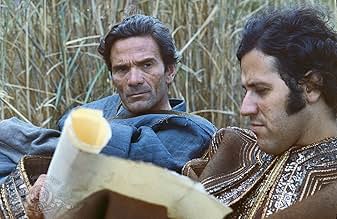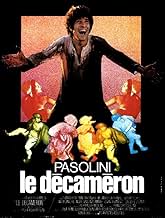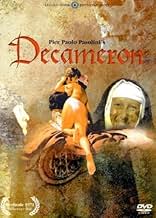- Premi
- 1 vittoria e 3 candidature totali
Jovan Jovanovic
- Rustico
- (scene tagliate)
Maria Gabriella Maione
- Una madonna
- (as Gabriella Frankel)
Pier Paolo Pasolini
- Allievo di Giotto
- (as P.P. Pasolini)
Recensioni in evidenza
The erotic and more or less picaresque stories of which this movie is composed is based upon a collection of tales written in the 14th century by Bocaccio an Italian writer already called the Voltaire of 14th century. In the Middle Ages there was a tendency later abandoned, of considering erotic adventures under a humoristic point of view. The most common "hero" of those tales was the cuckold husband. I'm not a great fan of Pasolini. However this movie is more or less successful in depicting a series of funny situations related with erotic entanglements. Its merit is more due to the narrative form than to the stories itselves some them less funny than others. But the composition of the successive scenes develops in a series of pictures full of colour and movement portraying the people in the streets in a realistic way, showing popular types such as peasants, merchants, priests, nuns, etc. most of them with no make-up at all which contributes to create a vivid atmosphere that really puts us in the middle of a mediaeval scenery. Not a masterwork but something worth to be seen anyway.
After adapting "Gospel according to Saint-Matthews" as no one had done before (and after ) him ,in a drastically anti-Hollywood style ("greatest story ever told" and the Italian's opus are worlds apart),Pasolini brushed away the cobwebs from Greek myths such as "Oedipe" and "Medea".Then he began his trilogy of life which would also encompass "the Canterbury tales" and "fiore della mille e una notte".
"Il decameron" is the first and it created the surprise in 1971:no one had been as bawdy as Pasolini at the time (and I wonder if someone had since).This is a movie made up of little sketches ,all adapted from
Boccacio and they respect the original stories (notably the" nightingale" segment)Probably the funniest of the trilogy,and the happiest -both "Canterbury" and "mille e una" feature some dark scenes :a gay is burned alive in the former,an adolescent's murdered in the latter.
That said,"Il decameron" and the two other parts are not for all tastes:bawdiness,vulgarity and scatology may repel some.
"Il decameron" is the first and it created the surprise in 1971:no one had been as bawdy as Pasolini at the time (and I wonder if someone had since).This is a movie made up of little sketches ,all adapted from
Boccacio and they respect the original stories (notably the" nightingale" segment)Probably the funniest of the trilogy,and the happiest -both "Canterbury" and "mille e una" feature some dark scenes :a gay is burned alive in the former,an adolescent's murdered in the latter.
That said,"Il decameron" and the two other parts are not for all tastes:bawdiness,vulgarity and scatology may repel some.
This film is a portmanteau film based on the famous 14th Century Italian story collection "The Decameron" by Giovanni Boccaccio. The book deals with ten people telling a story each every day for ten days, but Pier Paolo Pasolini (for obvious reasons) chooses merely nine stories for his film. Most of the stories deal with sex or deception (usually both).
Like all portmanteau films, some stories are better than others, but most of the stories in this film are so short that, if you don't enjoy one story, you don't have to wait long for the next one.
The film depicts a world filled with dirt and vulgarity but also full of life. Pasolini used a lot of ordinary people in his films and here we see many of the actors are not conventionally attractive (for example many have bad, or missing, teeth). Pasolini appears in the film as a pupil of the painter Giotto who is assigned to paint a mural on the wall of a church.
I found this film funny, charming and very entertaining. Definitely for adults though, there is quite a lot of sex and nudity on display here.
This was the first film in Pasolini's so-called "Trilogy of Life" and was followed by "The Canterbury Tales" and "The Arabian Nights".
Like all portmanteau films, some stories are better than others, but most of the stories in this film are so short that, if you don't enjoy one story, you don't have to wait long for the next one.
The film depicts a world filled with dirt and vulgarity but also full of life. Pasolini used a lot of ordinary people in his films and here we see many of the actors are not conventionally attractive (for example many have bad, or missing, teeth). Pasolini appears in the film as a pupil of the painter Giotto who is assigned to paint a mural on the wall of a church.
I found this film funny, charming and very entertaining. Definitely for adults though, there is quite a lot of sex and nudity on display here.
This was the first film in Pasolini's so-called "Trilogy of Life" and was followed by "The Canterbury Tales" and "The Arabian Nights".
I haven't yet seen too many Pasolini films / I intend to do so though... I suppose many combine him with the disgusting Salo (100 days in Sodoma) but thats not the case here.
In Decameron is actually several shorts, 9 or so, a series of funny tales in medieval Italy with similar touch and atmosphere. The humour is great, we had various laughs in almost every single bit. Some of the humour might of course offend hardcore Christians, but this is by no means a minus in my book. Pasolini's assault to this eras ethics is truly a delight! And even if this dates back to 1971, the stories remain fresh and provocative as is, and this is the height of Pasolini's vision.
Many indicated this as erotic. Sure, there is much of full frontal male and female nudity, some of which quite stimulating, which might be too much for some. But this ain't no erotic film. There are stories which have not erotic element in - and there are nude scenes which function as laugh scenes. Overall, this is a multi-layered short-stories film. I RECOMMEND THIS TO ALL FANS OF COMEDY & European FILMS.
In Decameron is actually several shorts, 9 or so, a series of funny tales in medieval Italy with similar touch and atmosphere. The humour is great, we had various laughs in almost every single bit. Some of the humour might of course offend hardcore Christians, but this is by no means a minus in my book. Pasolini's assault to this eras ethics is truly a delight! And even if this dates back to 1971, the stories remain fresh and provocative as is, and this is the height of Pasolini's vision.
Many indicated this as erotic. Sure, there is much of full frontal male and female nudity, some of which quite stimulating, which might be too much for some. But this ain't no erotic film. There are stories which have not erotic element in - and there are nude scenes which function as laugh scenes. Overall, this is a multi-layered short-stories film. I RECOMMEND THIS TO ALL FANS OF COMEDY & European FILMS.
Pier Paolo Pasolini has with the Decameron what is supposedly one of his "happiest" movies. This is not to say the film is always cheery- matter of fact a couple of the stories deep down are pretty dark and sad and cursed thanks to the repression of religion and mortal sins- but Pasolini's comedy here is sharp and his wit comes out in the obscene or in the random. It's a little like Bunuel only with a more earthy sensibility with the locations and slightly less surreal situations; it doesn't mean that Pasolini is any less ambitious with treating the foibles and stringent ways of the Catholic Church.
The Decameron's only big liability, in my estimation, is that it could be easy to get lost in the structure Pasolini sets up; it's nine stories, ranging from a Sicillian being swindled after finding out he's a brother to a sister of royalty until he's covered in feces, to a supposedly deaf-mute boy who becomes the sex toy for a bunch of sex-starved nuns, to a supposed 'Saint' who fools a priest into thinking he's such with his lackluster confessional, to a girl being met by her boyfriend on the roof and then being (joyfully) caught by her parents since his family is wealthy. They're all interesting stories, more often than not, with even a really short piece like the priest attempting to seduce his friend's wife providing something amusing or eye-catching visually.
But, again, all of these stories go from one into the next without much warning, and one may wonder when the next story really begins or if it's a continuation of the last. As it turns out, like the Phantom of Liberty, it's very stream-of-consciousness and one skewering of morality and sex can bleed easily into the other. And yet some may find this to be a more daring strength than others; certainly it's a very funny movie (if not quite as funny as Pasolini's masterpiece The Hawks and the Sparrows), like with the bit of the guy caught in the tomb, to the frankness of the parents asking the boy to marry their daughter on the rooftop - even just the strange feeling one gets watching the painter (played by, I think, Pasolini himself) in the act of creating an unusual but unique work on a church wall.
The greatest thing of all, for fans of the subversive, is that nothing is out of bounds for Pasolini, via his source material of the Boccaccio book, and he never is one to ever shy away from sex. That's also another asset this time around- unlike Arabian Nights we get some actually erotic bits thrown in the midst, if unintentionally, and on occasion (i.e. the shot following Lorenzo as he runs by the fence) the director conjures something powerful amidst the medieval/surreal/neo-realist pastiche. 8.5/10
The Decameron's only big liability, in my estimation, is that it could be easy to get lost in the structure Pasolini sets up; it's nine stories, ranging from a Sicillian being swindled after finding out he's a brother to a sister of royalty until he's covered in feces, to a supposedly deaf-mute boy who becomes the sex toy for a bunch of sex-starved nuns, to a supposed 'Saint' who fools a priest into thinking he's such with his lackluster confessional, to a girl being met by her boyfriend on the roof and then being (joyfully) caught by her parents since his family is wealthy. They're all interesting stories, more often than not, with even a really short piece like the priest attempting to seduce his friend's wife providing something amusing or eye-catching visually.
But, again, all of these stories go from one into the next without much warning, and one may wonder when the next story really begins or if it's a continuation of the last. As it turns out, like the Phantom of Liberty, it's very stream-of-consciousness and one skewering of morality and sex can bleed easily into the other. And yet some may find this to be a more daring strength than others; certainly it's a very funny movie (if not quite as funny as Pasolini's masterpiece The Hawks and the Sparrows), like with the bit of the guy caught in the tomb, to the frankness of the parents asking the boy to marry their daughter on the rooftop - even just the strange feeling one gets watching the painter (played by, I think, Pasolini himself) in the act of creating an unusual but unique work on a church wall.
The greatest thing of all, for fans of the subversive, is that nothing is out of bounds for Pasolini, via his source material of the Boccaccio book, and he never is one to ever shy away from sex. That's also another asset this time around- unlike Arabian Nights we get some actually erotic bits thrown in the midst, if unintentionally, and on occasion (i.e. the shot following Lorenzo as he runs by the fence) the director conjures something powerful amidst the medieval/surreal/neo-realist pastiche. 8.5/10
Lo sapevi?
- QuizIl Decameron (1971) is the first film in Pier Paolo Pasolini's "Trilogy of Life," continuing with I racconti di Canterbury (1972) and concluding with Il fiore delle mille e una notte (1974). Each film was an adaptation of a different piece of classical literature focusing on ribald and often irreligious themes. The tales contain abundant nudity, sex, slapstick and scatological humor.
- BlooperWhen the Mother Superior seduces the deaf-mute boy, he's sleeping in a tomato garden. Tomatoes are a New World crop that wouldn't be brought to Italy for another two centuries. The same is true of the corn (maize) growing in the convent's little field.
- Citazioni
Allievo di Giotto: Why create a work of art when dreaming about it is so much sweeter?
- Versioni alternativeAlthough the cinema version was intact the 1988 UK Warner video was cut by 22 secs by the BBFC to remove shots of naked genitals during the bedroom sex scene with the nun. The cuts were fully restored in the 2001 BFI DVD release.
- ConnessioniEdited into Porno e libertà (2016)
- Colonne sonoreFenesta Ca Lucive
Written by Guglielmo Cottrau, Vincenzo Bellini and Giulio Genoino in 1842
Performed by Franco Citti
Sung by Ser Ciappelletto and his Neapolitan hosts in Germany. Also sung by one of the Neapolitans to a monk.
I più visti
Accedi per valutare e creare un elenco di titoli salvati per ottenere consigli personalizzati
- How long is The Decameron?Powered by Alexa
Dettagli
- Data di uscita
- Paesi di origine
- Lingue
- Celebre anche come
- El decamerón
- Luoghi delle riprese
- Aziende produttrici
- Vedi altri crediti dell’azienda su IMDbPro
Botteghino
- Lordo in tutto il mondo
- 839 USD
- Tempo di esecuzione1 ora 51 minuti
- Mix di suoni
- Proporzioni
- 1.85 : 1
Contribuisci a questa pagina
Suggerisci una modifica o aggiungi i contenuti mancanti

Divario superiore
By what name was Il Decameron (1971) officially released in Canada in French?
Rispondi



























